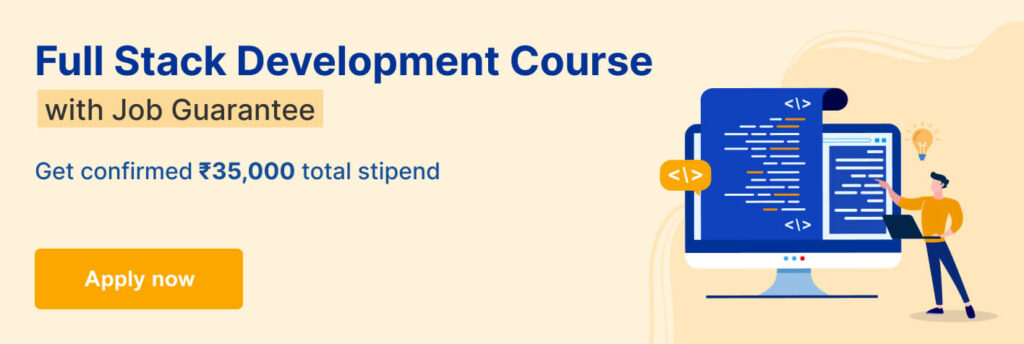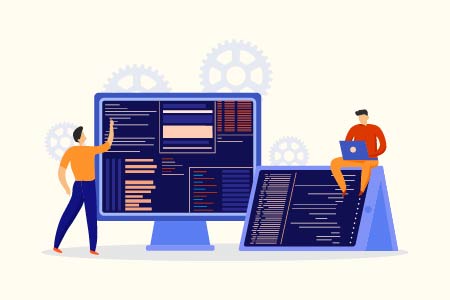Top 10+ Software Engineering Courses
According to sources, there will be a 22% increase in employment for software engineers by 2030. However, to keep up with these rising trends, individuals need to upskill through various software engineering courses. With so many options available in the market, deciding which is the best fit for your goals can be overwhelming. Therefore, let us look at some software engineering courses and key factors to help you decide which course is best for your software engineering career.
Who is a Software Engineer?
A software engineer designs develops, and tests software applications, network control systems, middleware, computer games, and other programs for various devices. They apply engineering principles and knowledge of programming languages and frameworks to create software solutions for users.
A software engineer works on an interdisciplinary team with diverse experts to collaborate on various projects. To become a software engineer, you require a bachelor’s degree in software engineering, computer science, or other relevant field. A master’s degree or higher education can make you eligible for more specialized software engineering roles.
Top Courses for Software Engineering
Software engineering is a multifaceted field that includes handling data sets, cloud computing, software development, testing, and other aspects. Below is a list of the best degree courses in software engineering:
1. Meta Back-End Developer
A back-end developer is an expert who specializes in building and maintaining server-side logic, databases, and overall functionality of websites and web applications. They work behind the scenes to design and implement an architecture that supports the user interface and seamlessly integrates all the front-end technologies. To work as a backend developer, consider pursuing a certification course and learning all the essential skills.
The Meta back-end developer course teaches the essentials of software engineering and coding with a focus on back-end development, covering topics such as server-side scripting, database management, and application development. You can take a short-term web development course to gain the basic skills required for the Meta back-end developer course.
With a proper course, one can prepare themselves and unlock lucrative web development internship opportunities.
Skills You Will Gain: Python, Linux, version control with Git, MySQL, Django web framework, APIs
Job Roles to Pursue After Certification
- Back-end Developer
- Software Engineer
- Web Developer
- Back-end Engineer
- Software Architect
2. Artificial Intelligence (AI) and Machine Learning (ML)
The increasing use of AI/ML in companies has led to a significant increase in the demand for competent AI experts. Specialists in artificial intelligence and machine learning understand business requirements and design AI and ML algorithms to extract meaningful insights from datasets to facilitate informed decision-making.
These professionals also leverage AI and ML technologies to solve complex real-life issues and automate processes to enhance productivity and efficiency in various operations. Overall, this is a dynamic field that offers vast opportunities.
To enroll in an artificial intelligence course, one must have a solid background in mathematics, statistics, and data analysis and should be proficient in high-level programming languages such as Python. With an online machine learning course, students can gather the necessary skills and knowledge for basic and advanced technological concepts.
Skills You Will Gain: Supervised and unsupervised machine learning, data analysis, basics of Python programming, data exploration, linear regression, dimensionality reduction
Job Roles to Pursue After Certification
- Machine Learning Engineer
- Software Engineer
- Artificial Intelligence (AI) Engineer
- Data Engineer
- Robotics Engineer
- Data Scientist
3. Mobile App Development
Mobile app development is the process of creating software applications for smartphones, tablets, and digital assistants. Major tasks involved in this process include building installable software bundles, implementing back-end services, and testing the application.
Android and iOS are two of the most popular platforms for developing applications. To work as a mobile application developer, you can take up an Android app development course. It trains you to create mobile applications compatible with the Android operating system. The course begins with basic knowledge of Android and its features and then moves to explain the logical understanding of writing code using Kotlin, a popular Android programming language.
Skill You Will Gain: Environment and tools used for developing Android apps, concepts and functions in Kotlin, Android Studio, and advanced functionalities like fragments, navigation view, databases, fetching data
Job Roles to Pursue After Certification
- Mobile App Developer
- Android App Developer
- Video Game designer
- Web Developer
4. Data Analytics
Data analytics is a branch of data science that analyzes raw data to extract valuable insights that drive decision-making in organizations. Various industries have started tapping into the capabilities of big data by implementing data analytics. This makes it an ideal course for software engineers to take.
Data analytics is utilized in software engineering for several purposes, including improving data quality, optimizing data processing pipelines and workflows, designing data models to structure data effectively, monitoring system performance in real-time, and more. Many of these tasks require the use of SQL, a fundamental tool for data engineers. It enables professionals to extract, transform, model, integrate, analyze, and report data effectively. Therefore, enrolling in an online SQL course will enable you to build a strong foundation in SQL for data analytics. You will learn about joins, queries, and essential SQL commands and functions to kickstart your journey in software engineering.
Skills You Will Gain: Programming languages, such as Python, R, Java, Ruby, and C++. With proper guidance, you can also get access to data analytics internships.
Job Roles to Pursue After Certification
- Data Engineer
- Business Analyst
- Data Scientist
- Financial Analyst
- Risk Analyst
- Business Intelligence Analyst
- Quantitative Analyst


5. Software Testing
Software testing is a critical process in the software development lifecycle that evaluates the quality and functionality of a software product. The primary goal of software testing is to ensure that the software meets specified requirements, complies with the standards, operates well, and provides a good user experience. In software engineering, the testing phase is crucial for quality assurance, risk management, and continuous improvement. Therefore, a software engineer or related roles should possess skills and training in software testing.
A software testing course is designed to equip students with the necessary abilities to excel as quality assurance engineers. With a software testing course, you will be equipped with a solid foundation in software testing and automation testing.
Skills You Will Gain: Java Basics, automation frameworks, Selenium WebDriver, locators, methods
Job Roles to Pursue After Certification
- Software Testing Engineer
- Quality Analyst
- SCM Analyst
6. Cybersecurity
Organizations are actively searching for proficient cybersecurity experts to strengthen their systems, acknowledging the severe repercussions of cyberattacks. A course in cyber security or an online ethical hacking course will expand your knowledge of malware analysis, phishing, etc., while helping you land potential cybersecurity career opportunities.
Cyber security is the practice of safeguarding computer systems, networks, and data from cyber-attacks, unauthorized access, and other malicious activities. It comprises a set of techniques, processes, and technologies to secure digital assets, mitigate risks, and prevent security breaches. Some popular cyber security measures include encryption, firewalls, incident response, cybersecurity training, etc.
Skills You Will Gain: Information security controls, ethical hacking, basics of computer networking, footprinting, reconnaissance, vulnerability assessment
Job Roles to Pursue After Certification
- Information Security Analyst
- Ethical Hacker
- Digital Forensics Analyst
- Application Security Engineer
- Incident Responder
- Cryptographer
7. AWS Certified Solutions Architect Associate
This certification is designed to teach individuals about cloud computing and the various features of the Amazon Web Services (AWS) platform. Key topics covered in the course include AWS architecture, storage solutions, database services, security measures, and cost optimization.
This certification exam is for individuals with experience in AWS technology, on-premises IT experience, understanding of mapping on-premises to cloud, and working with cloud services. You must take the AWS Certified Solutions Architect – Associate exam to earn this certification.
To prepare for this exam, you can brush up your knowledge through a short-term online cloud computing with AWS course.
Skills You Will Gain: AWS services, deployment, Management Console, Command Line Interface
Job Roles to Pursue After Certification
- Cloud Solutions Architect
- IT Support Specialist
- Cloud Systems Administrator
- Cloud DevOps Engineer
8. IBM DevOps and Software Engineering
The IBM DevOps and Software Engineering course is designed to educate students on the responsibilities of a DevOps engineer and the complex concepts necessary for developing, evaluating, and maintaining software.
DevOps is a set of philosophies, practices, and tools that enhance an organization’s ability to deliver applications and services faster. It encourages the adoption of Agile methodologies and cloud technologies to enable rapid and frequent software releases while maintaining reliability and security. By promoting a culture of shared responsibility, continuous improvement, and feedback, DevOps enhances the software quality, reduces time to market, and improves the overall efficiency of software development processes.
Skills You Will Learn: Agile philosophy, Scrum methodology, Python basics, REST APIs, automation, continuous integration (CI), GitHub, Docker, Kubernetes
Job Roles to Pursue After Certification
- DevOps Engineer
- Cloud Infrastructure Engineer
- Systems Programmer
- Associate Technology Specialist
9. Web Programming / Web Design
Web developers use coding languages to construct the fundamental framework of websites, while web designers enhance the user experience and aesthetic aspects of the web. Furthermore, these disciplines require an understanding of data structures, object-oriented programming, algorithms, and interface design principles. A web development course will enable you to gain expertise in the fundamentals of web design and programming.
Skills You Will Gain: HTML, CSS, JavaScript, PHP, Bootstrap basics
Job Roles to Pursue After Certification
- Web Designer
- Graphic Designer
- UX/UI Designer
- Interaction Designer
- Web Developer
- Full-Stack Developer
- Front-End Developer
- Back-End Developer


10. IBM Applied Software Engineering Fundamentals Specialization
The MTA Software Development Fundamentals certification is an introductory course offered by Microsoft. It evaluates and validates a candidate’s basic understanding of software development principles such as object-oriented programming, web and desktop applications, and databases. The course covers various areas like programming languages, data types, control structures, and error handling.
Jobs to Pursue After Certification
The following are the career opportunities:
- Help Desk Technician
- Video Game Designer
- Website Developer
- IT Security Specialist
- Database Administrator
- Network Administrator
- Network Architect
- Software Engineer
- Systems Analyst
11. Google IT Automation With Python
This certification course enables students to build a strong foundation in software engineering. You get to learn the fundamentals required for software development and related technologies. The curriculum covers approaches to deployment architectures, execution of Linux commands, creation of shell scripts using BASH, creating Python applications, and GitHub repositories.
You can analyze problems effectively, design effective solutions, and implement reliable and maintainable software applications by learning the concepts, principles, procedures, and best practices of software engineering. Understanding these principles also makes it easier to work effectively as a team, communicate ideas clearly, and quickly adjust to new technologies.
Skill You Will Gain: Software design and architecture, Python programming, Git and GitHub, software development lifecycle (SDLC), Linux
Job Roles to Pursue After Certification
- Help Desk Technician
- Video Game Designer
- Website Developer
- IT Security Specialist
- Database Administrator
- Network Administrator
- Network Architect
- Software Engineer
- Systems Analyst
How to Choose the Best Software Engineering Courses?
The following are a few points to consider when trying to choose which course is best for software engineering:
- Outline Your Objective: Outline your goals and evaluate the course material to confirm its relevance to your educational goals and personal preferences. Also, check if you need any prior skills or knowledge before starting the course. This allows you to prepare well before enrolling in the course and get its maximum benefit.
- Budget for the Course: Review available software engineering courses and consider enrolling in a course that is within your budget. Take into account that some courses require you to pay the complete course fee upfront, while others may include an option of monthly payments. You can select the payment plan according to your preference.
- Mode of Learning: Ensure that the mode of learning is suitable for your preference, either online, in-person, or hybrid courses. Check for prerequisites, such as having a specific system configuration essential for accessing the course on different devices.
- Consider Payment Framework: There are different modes of fee payment for engineering courses (EMI, quarterly, credit). Evaluate if your desired course accepts any payment that suits your needs. If your preferred payment is unavailable, you may contact customer support to seek information about the alternatives or if the payment mode will be available anytime soon.
- Check the Terms and Conditions: Pay attention to the terms and conditions before choosing a program. Being well-informed about this aspect will help complete the course as per the timeline. Check if there are any additional benefits promised with the course to get timely access to them before the course completion. These benefits could include placement assistance and job application preparation.
- Evaluate Course Authenticity and Validity: Check if the course has valid accreditation and provides valuable certifications recognized within the industry. For example, all the courses at Internshala provide you with an Internshala Trainings certificate and government-approved certificate from NSDC (National Skill Development Corporation) & Skills India. Additionally, research the qualifications of the course instructor to know if they have relevant experience and credentials. You can refer to online reviews to get an overview of the learning journey.
- Review Program Schedule: Consider the course duration and decide if it is suitable for you based on your availability and schedule. Check if the self-learning option is available to navigate the course at your own pace. This enables you to train while managing your other priorities.
Software Engineer Roles and Responsibilities
The role of a software engineer is to build innovative, quality, and high-functionality software that follows the technical specifications and complies with coding standards. A software engineer performs a variety of tasks, here are some of the responsibilities they undertake:
- Initiating and managing software development lifecycle (SDLC).
- Creating documentation and layouts to identify requirements and solutions.
- Developing software system validation and testing methods.
- Writing executable and well-designed code.
- Integrating different software components into the functional system.
- Working with cross-functional teams and clients to communicate project proposals and statuses.
- Engaging in planning and design to outline future upgrades to software systems.
- Monitoring system performance to identify issues and provide optimal solutions for troubleshooting.
- Deploying software programs and assessing user feedback to make necessary changes.
- Maintaining software functionality and ensuring it is updated with the latest features.
Software Engineer Skills
Software engineers apply a set of principles and techniques related to mathematics, computer science, and engineering to design, develop, and test software applications. To perform these tasks of the software development lifecycle, they require a combination of skills. Some of these include:
- Technical Skills: Proficiency in programming languages like Java, Python, JavaScript, Ruby, and C# is essential to become a successful software engineer. Additionally, you should be familiar with SQL or NoSQL and database management systems.
- Industry-Specific Skills: In addition to the basic technical skills, you should have an understanding of cybersecurity fundamentals, DevOps practices, mobile development, machine learning, artificial intelligence, and cloud computing. This knowledge is beneficial when you apply for specialized roles within software engineering.
- Soft Skills: These skills help you enhance your productivity and overall effectiveness of your work. Collaboration, adaptability, communication, time management, attention to detail, critical thinking, and problem-solving skills are some of the abilities that software engineers should possess.
Conclusion
Deciding which course is best for software engineering ultimately depends on your unique preferences, goals, and learning style. Take the time to research and choose a course that aligns with your aspirations, and remember that continuous learning is a key aspect of a successful career in software engineering. Check out our blogs on job tips to find the best guidance on the interview process, resume writing, and job search tips.
FAQs
IBM DevOps and software engineering, data analytics, artificial intelligence and machine learning, and web development are some of the best software engineering courses that you can explore.
Cloud engineering, DevOps engineering, game development, and quality assurance engineering are some of the best branches of software engineering.
Some of the best programming languages to learn in 2024 are Python, Java, C++, JavaScript, and Ruby. You can choose the language based on your project requirements and your familiarity with the syntax and functions of the language.
Full-stack development, cloud computing, and machine learning are some of the software courses that make you eligible for the highest-paying jobs in software engineering.
The monthly salary of a software engineer ranges between ₹50,000 to ₹1,33,000. On average, individuals in this field can expect to earn ₹83,333 monthly. You can explore the top highest-paying companies for software engineers in India to seek high-paying work opportunities.







